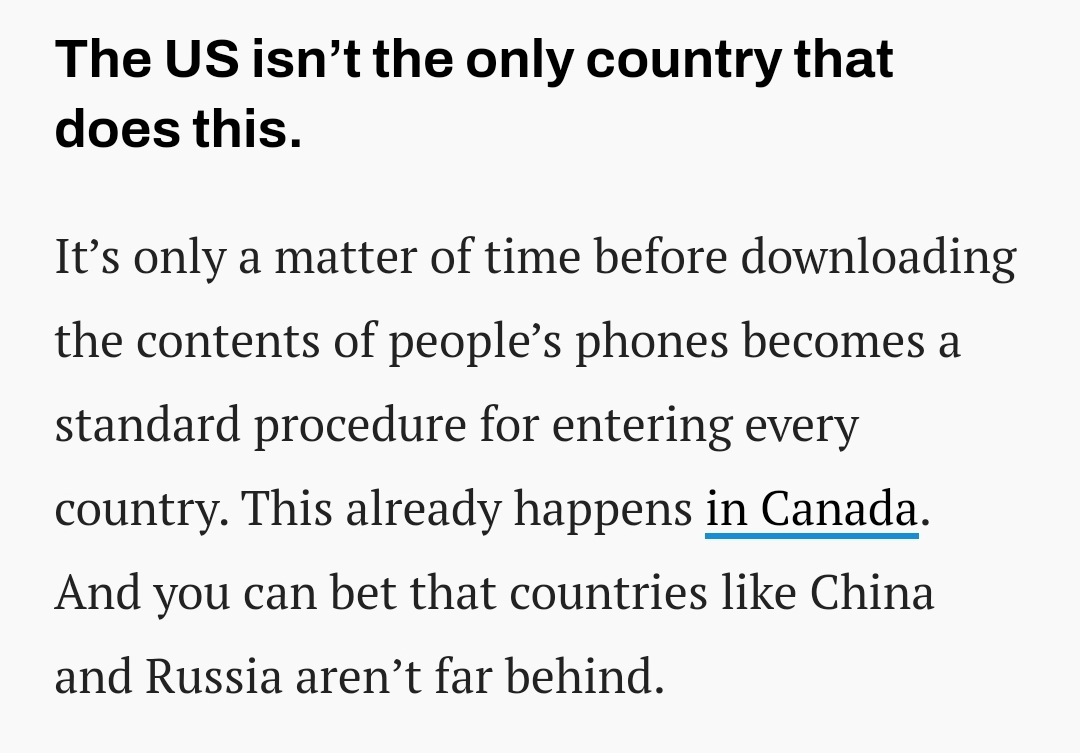I’ll admit:
While I’m not too “gung-ho” over privacy wonks and how obsessed people are with it (I already take my chances and know the risks) this seems like an escalation.
Okay, I’m all ears:
I’m a Communist Party member so how do I make sure this doesn’t happen? Any other ways?
Yeah you have no rights at international border crossings.
So, several ways to do this:
- Ship your phone ahead of you to your hotel.
Pros:
- Phone isn’t on you or even with you at the airport or your luggage so customs can’t really search it when you pass by.
Cons:
- Things do get lost, damaged, stolen, destroyed in shipping. You could arrive and find you no longer have a phone.
- Your phone could also arrive late, be delayed and arrive at your shipping address after you leave if you’re not staying long.
- No phone at the airport or on planes, can’t use directions, maps, basic searching, can make life more difficult if you’re not an experienced traveler in the region you’re going to.
- If they are specifically targeting you (we’re probably a little early for this but as conditions deteriorate in the west and they desperately try and crush the left they’ll go further and further against anyone organizing) they can see you’re shipping something ahead to a hotel and put two and two together, do mail/package intercept, and get your data.
- Take your phone with you but wipe it beforehand. (Either be content with a refreshed phone with no personal data for them to get but also no personal data for you to use OR back it up to the cloud or another device like an encrypted laptop also with you to restore when you get to your destination and repeat before heading back to your home country)
Pros:
- You have your phone with you, you can still use mapping software, do searches on arrival, play games, etc.
- Your phone can be searched by them and they’ll find nothing and let you pass.
- Once you’re in the other country you have all your data with you, your social media, friends, contacts, photos, notes, email access, etc.
Cons:
- It can be a minor hassle to back up and restore data. Be sure to keep another backup at home in case something happens to the one with you so worst case scenario you can restore everything once you get back home again.
I also should offer an aside. If you are backing up to your encrypted laptop that you are bringing with you as well, you must set the password or some element of it to something you do not recall. Have a friend keep it (even can be half of a password so they don’t know the whole thing but you remember the other half) and only send it to you once you message them at your destination and tell them you are safe, not under duress, not being held, etc. If customs stops you and insists on you decrypting the laptop you inform them it is for business purposes and you do not have the means to decrypt it. Many legitimate companies enforce border crossing policies like this so you won’t be that unique. They can hold you and make you miss your flight at worst but cannot prevent you from re-entering or leaving and must let you go after 72 hours max. Since you’re letting them search your phone they’ll probably let you through.
- Buy a phone specifically for international travel. It’s up to you the specs of this. You can certainly buy some budget $140 Chinese android and it should work fine or you could get something nicer. Anyways you don’t use this phone at home, only while traveling so it has no sensitive data on it.
Pros:
- They can search your phone it won’t do them that much good because your sensitive domestic data is not on it and never will be.
- Less hassle though obviously more expense.
Cons:
- You don’t have access to things like your emails, messages, social media, notes, photos.
- The camera on such a thing may not be as good as your domestic phone.
3 is maximum protection but also with maximum sacrifices. 2 is easiest and least hassle with cloud backups or even local encrypted laptop backups. 1 is more hassle than 3 in many ways but does have its own perks.
I’m not going to mention the possibility of them implanting malware on your device while taking it to another room to examine it as unless you’re very high profile they probably won’t and unfortunately they have other ways of doing that Over the Air without having to physically access your device if you’re a high priority target tasked to NSA or whatever. So best to assume it’s possible your device can be compromised at any time and yet you have to live in the era you live in which means using a phone and minimizing risks to comrades which means not allowing them selective collection of your data at border crossings as on the whole that’s likely the only way they’ll know what you’re up to.
Damn.
Effort-post.
You make it look easy.
I should take note.
Happy to help comrade. It’s an area of expertise for me so it really does just flow out of me.
noice!

Thing that happen in good democracy place? Probably going to happen in bad totalitarian place. Because it’s bad and totalitarian. Ok.
"NOT CANADA!
CANADA IS GOOD!
EVEN CANADA!?"
- liberals
When travelling with your phone, you should definitely turn it off when going through customs, so that fingerprint or face unlocking won’t work. But you are under no obligation whatsoever to unlock your phone when they ask you to.
Say no, ask to use their phone to call someone who can get you a lawyer or contact your embassy. The people I know who’ve done this, haven’t been detained for more than a few hours, never overnight. Any more than that, they risk legal and public repercussions, which is the last thing they want.
Don’t give them what they want, and let them know you’ll be a pest throughout the entire process. The author’s advice of “just unlock your phone because they can technically detain you forever” is extremely misguided, and exactly what customs wants you to do.
Thank you! You’re the best, dessalines!
Xiaomi phones have a “Second Space” security feature. It’s like logging in to different user account on windows.
You use a different finger print/pin to unlock the phone so technically you’re still complying even though your phone doesn’t have access to any of your real data.
Perhaps I should get a Xiaomi…
Thanks!
If you have a PinePhone or PinePhone Pro, there’s a simple solution. You can have two OSes installed at the same time. One on an SD card and one on the phone’s built-in eMMC. If you’re ever forced to provide a password, you can use a bootloader like Tow-Boot, which allows you to boot off of the SD card by holding the volume down button. Then, you can just provide the password to that alternate OS and they can look at it all they want, they’ll find nothing, and anything they install will be confined to that SD card, which you can easily wipe once you arrive, or just discard it and get a new one because small SD cards are really cheap.
Oho
all the hard work that Apple and Google have invested in encrypting the data on your phone — and fighting for your privacy in court — will be a completely moot point.
🤔
This is something that everyone should be wary of.
Yes.
Buy another phone that’s clean. Androids can be like $100 on Newegg.
Is Newegg cheaper?
Never heard of it, but i know AliExpress is very cheap.
true
Just an example that came to mind
ah understood
Android also has a multiple users feature, although I’m not sure whether it’d help in these situations; scanner tools might detect the second user even if they can’t immediately access the data from another profile, then you’re back to square one, except under additional suspicion.
My best suggestion is a combo of the “ship your phone” and “wipe your phone” suggestions elsewhere in thread: use a custom recovery to take a full backup onto an SD card, do a full wipe, set the phone up again with your most innocuous apps and content, then ship SD card and restore the backup when you’re through the completely rights-free border zone
Shipping sounds like the most easy option with the least amount of hassle (although not with the full protection that any additional steps might guarantee).
I might go above that in terms of precautions, though that seems like a good baseline for someone like me.









